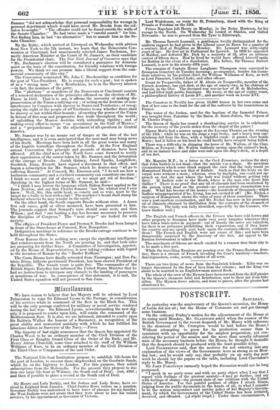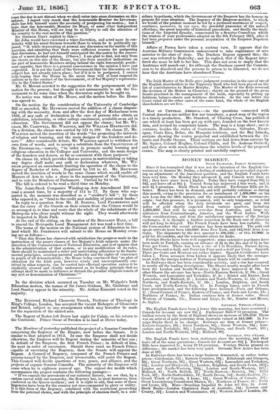POSTSCRIPT.
SATURDAY.
As yesterday was the anniversary ef the Queen's accession, the House of Lords did not sit ; but the House of Commons sat and got through some business.
On the ordinary Friday's motion for the adjournment of the House at its rising until Monday, Mr. GLADSTONE asked when the answer of the British Government to the recent despatch of Mr. Marcy with reference to the dismissal of Mr. Crampton would be laid before the House ? Without attempting to press for its production sooner than is consistent with an opportunity for the amplest preparation, yet con- sidering the period of the session and the more than usually advanced state of the necessary business before the House he thought it desirable that the despatch should be produced with the least possible delay. Lord PALMERSTON said, that the motives for not entering into any explanation of the views of the Government were as strong as on Mon- day last ; and he would only say, that probably on an early day next week he should lay the papers on the table, including Lord Clarendon's reply to Mr. Marcy. Sir JOHN Ructivurox earnestly hoped the discussion would not be long postponed.
"I speak in no party sense and with no party object when I say that I regard with feelings of the greatest anxiety—I may go further, and say with feelings of shame—the present state of our relations with the United States of America. For this painful position of affairs I attach blame, judging from the public documents in the hands of all, to what I consider to be the serious misconduct and unwise policy of her Majesty's Govem- ment, by which the Government of the United States has been irritated, deceived, and offended. (4 slight laugh.) Under these circumstances, I
trust the day is not distant when we shall enter into some discussion on this subject. I regret very much that the honourable Member for Inverness- shire has felt himself under the necessity of postponing his motion ; but I hope that the honourable Member for Mayo, or some other independent Member of this House will ere long be at liberty to call the attention of the country to the reafmerits of this question." Sir GEORGE GREY replied to this- Sir John would have exercised a wiser discretion, and acted more in con- formity with his usual fairness towards those to whom he is politically op- posed, "if, while deprecating at present any discussion= the merits of this question, and admitting that there were sufficient reasons for postponing that discussion, he had not himself anticipated the discussion by the expres- sion of a most decided opinion. (Cheers.) I am glad to find, not only from the cheers on this side of the House, but also from manifest indications on the part of honourable Members sitting behind the right honourable gentle- man opposite, that there is a general concurrence in the opinion I have just expressed. It is not the fault of the Government that the discussion on this subject has not already taken place; but if it is to be postponed, I cannot help hoping that the House in the mean time will at least suspend its opinion as to the conduct of the Government, or of her Majesty's representa- tive in the United States."
Mr. G. MOORE acceded to the suggestion for the postponement of his motion for the present ; but thought it not unreasonable to ask the Go- vernment to fix some time when the discussion might be brought on.
No notice was taken of Mr. Moore, and the motion before the House was agreed to.
On the motion for the consideration of the University of Cambridge Bill as amended, Mr. HEYWOOD moved the addition of a clause dispens- ing with the necessity, from and after the first day of Michaelmas term 1856, of any oath or declaration in the case of persons who obtain an exhibition, scholarship, or other college emolument, available as an aid in education. The Government did not oppose the clause ; but Mr. WI- GRAM, MT. CARDWELL, MT. WALPOLE, and Sir WILLIAM HEATECOTE did. On a division, the clause was carried by 151 to 109. On clause 27, Mr. WArzoks moved the insertion of the words "for promoting the interests of religion and learning, and the main designs of the founders and do- nors. After considerable debate, Mr. WALPOLE agreed to withdraw his own form of words, and to accept a substitute from the CHANCELLOR of the EXCHECLUER,-namely, "in order to promote useful learning and religious education in the Colleges and University, and the main design • of the founders and donors, so far as consistent with those purposes."
On clause 44, which provides that no person in matriculating or taking any degree shall make any oath or declaration whatever, Mr. Wr- mien proposed an amendment limiting the operation of the clause to the degree of Bachelor of Arts. Negatived by 118 to 41. Mr. Hirrwoon moved the insertion of words in the same clause which would enable all Masters of Arts to take a share in the management of the University, and to vote for Members of Parliament. Carried by 84 to 60.
The bill is ordered to be read a third time on Monday.
The Joint-Stock Companies Winding-up Acts Amendment Bill was read a second time, by a majority of 112 to 77. By those who sup- ported it, the measure was described as a "creditor's bill "; by those who opposed it, as " fatal to the credit and stability,_ of joint-stock banks." In reply to a question from MT. H. BARING Lord PALMERSTON said that the entry of the Guards on their return from the Crimea would be so arranged as to time and route that the whole of the inhabitants of the Metropolis who chose might witness the sight. They would afterwards be inspected in Hyde Park. At the end of the sitting, on the motion of Sir BENJAMIN HALL, a bill to amend the Metropolis Local Management Act was read a first time. The terms of the motion on the National system of Education in Ire- land which Mr. FORTESCUE Will submit to the House on Monday even- ingare as follows- ' That this House has observed with satisfaction the progress made in the instruction of the poorer classes of her Majesty's Irish subjects under the direction of the Commissioners of National Education, and is of opinion that in the administration of that system, or in any modification of its rules, there should be maintained a strict and undeviating adherence to its funda- mental principles, securing parental authority and the rights of conscience in pupils of all denominations ; the House being convinced that no plan of education for the Irish poor, however wisely and unexceptionably con- trived in other respects, can be carried into effectual operation unless it be explicitly avowed and clearly understood as its leading principle that no attempt shall be made to influence or disturb the peculiar religious tenets of any sect or denomination of Chriatians.' "
In the division which occurred on Tuesday on Mr. Walpole's Irish Education motion, the names of Sir James Graham, Mr. Gladstone and Lord Stanley appear in the minority. Mr. Arthur Kinnaird voted in the majority.



























 Previous page
Previous page